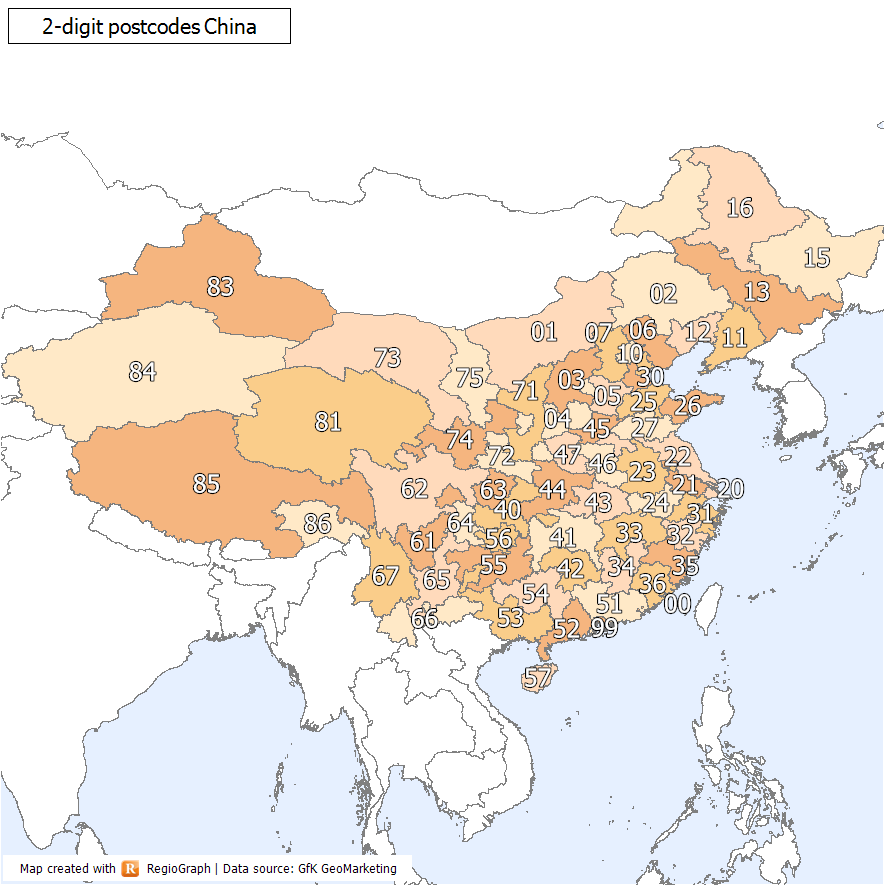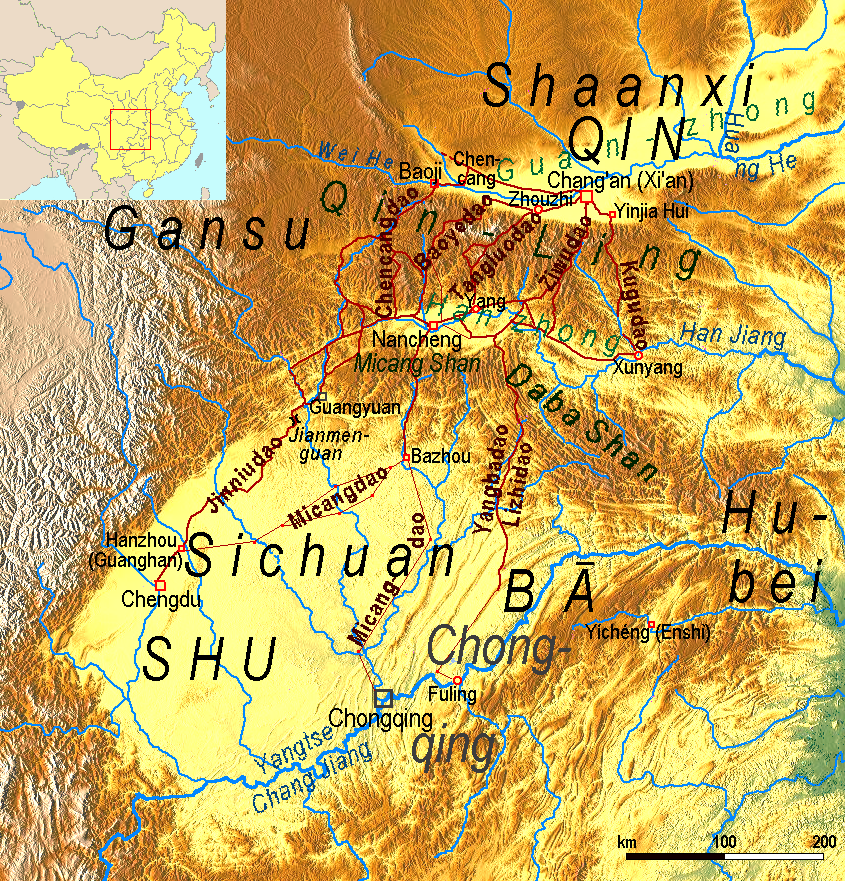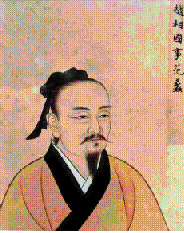|
Xichuan County
Xichuan County () is a county in the southwest of Henan province, China, bordering the provinces of Hubei to the south and Shaanxi to the northwest. It is under the administration of the prefecture-level city of Nanyang. Xichuan has an area of and a population of . Both of the Danjiangkou Reservoir and the Central route of South–North Water Transfer Project's canal head are located in Xichuan. History The state of Chu's first capital Danyang was in Xichuan. Geography Xichuan is located south of Funiu Mountain. The county is about 107 kilometers from northwest to southeast, with a width of 46 kilometers and a total area of 2,798 square kilometers. Xichuan County is a horseshoe-shaped terrain that protrudes to the southeast in the northwest direction. The northwest is a low mountain area, the middle is a hilly area, and the southeast is a hilly and alluvial plain. Danjiangkou Reservoir is located in the south of the county. The northern and northwestern parts of the county ... [...More Info...] [...Related Items...] OR: [Wikipedia] [Google] [Baidu] |
Postal Code Of China
Postal codes in the People's Republic of China () are postal codes used by China Post for the delivery of letters and goods within mainland China. China Post uses a six-digit all-numerical system with four tiers: the first tier, composed of the first two digits, show the province, province-equivalent municipality, or autonomous region; the second tier, composed of the third digit, shows the postal zone within the province, municipality or autonomous region; the fourth digit serves as the third tier, which shows the postal office within prefectures or prefecture-level cities; the last two digits are the fourth tier, which indicates the specific mailing area for delivery. The range 000000–009999 was originally marked for Taiwan (The Republic of China) but is not used because it not under the control of the People's Republic of China. Mail to ROC is treated as international mail, and uses postal codes set forth by Chunghwa Post. Codes starting from 999 are the internal codes use ... [...More Info...] [...Related Items...] OR: [Wikipedia] [Google] [Baidu] |
Qinling
The Qinling () or Qin Mountains, formerly known as the Nanshan ("Southern Mountains"), are a major east–west mountain range in southern Shaanxi Province, China. The mountains mark the divide between the drainage basins of the Yangtze and Yellow River systems, providing a natural boundary between North and South China and support a huge variety of plant and wildlife, some of which is found nowhere else on earth. To the north is the densely populated Wei River valley, an ancient center of Chinese civilization. To the south is the Han River valley. To the west is the line of mountains along the northern edge of the Tibetan Plateau. To the east are the lower Funiu and Dabie Shan which rise out of the coastal plain. The northern side of the range is prone to hot weather, however the physical barrier of the mountains mean that the land to the North has a semi-arid climate, with the lack of rich, fertile landscape that can not support a wealth of wildlife. The mountains also acted a ... [...More Info...] [...Related Items...] OR: [Wikipedia] [Google] [Baidu] |
Fan Zhen
Fàn Zhěn (范縝, hanyupinyin Fàn Zhěn) (c. 450 - 515) was a Chinese philosopher, politician, and writer. He was an atheist of the Southern Qi Dynasty, remembered today for his treatise ''Shén Miè Lùn'' (simplified Chinese 神灭论, traditional Chinese 神滅論, "On the Annihilation of the Soul"). Fàn was born into a poor family in today's Zhumadian, Henan province. He was a member of a cadet branch of the elite Fàn family, and became a high-ranking official thanks to his erudition. In response to the prevailing Buddhist movement of his time, he wrote ''Shen Mie Lun'' in 507, a treatise denying the ideas of reincarnation and body-soul dualism. A courtier tried to persuade Fàn to give up his opinion, in exchange for a higher official title, but Fàn refused. Emperor Wu of Liang Emperor Wu of Liang () (464 – 12 June 549), personal name Xiao Yan (蕭衍), courtesy name Shuda (叔達), childhood name Lian'er (練兒), was the founding emperor of the Chinese Li ... [...More Info...] [...Related Items...] OR: [Wikipedia] [Google] [Baidu] |
Fan Ye (historian)
Fan Ye (398 – 23 January 446), courtesy name Weizong (蔚宗), was a Chinese historian and politician of the Liu Song dynasty during the Southern and Northern dynasties period. He was the compiler of the historical text ''Book of the Later Han''. The fourthThe age order of Fan Ye and his brothers was listed in Fan Tai's biography in ''Book of Song'' (volume 60) son of Fan Tai (范泰), Fan Ye was born in present-day Shaoxing, Zhejiang, but his ancestral home was in Nanyang, Henan. He was a noted atheist who heavily criticised Buddhism, Yin and Yang, and the concept of the Mandate of Heaven. To this end, he cited Zhang Heng's scientific studies as evidence. Fan has a biography in the ''Book of Song'' (volume 69). References Sources * Tan, Jiajian"Hou Hanshu" ("Book of Later Han") ''Encyclopedia of China The ''Encyclopedia of China'' () is the first large-entry modern encyclopedia in the Chinese language. The compilation began in 1978. Published by the Encyclopedia ... [...More Info...] [...Related Items...] OR: [Wikipedia] [Google] [Baidu] |
Fan Li
Fan Li () from the Spring and Autumn period, was an ancient Chinese military strategist, politician, and businessman. Fàn Li was an important political and military advisor to Goujian, the king of Yue. He later was known as Tao Zhu Gong (陶朱公) a name he took after achieving a decisive victory for Yue over the state of Wu and retiring to live a secluded life with his wife Xi Shi, one of the most famous beauties in Chinese history. Biography Along with King Goujian of Yue, Fàn Li was once a hostage of the state of Wu. After three years of captivity the two of them returned to Yue where Fàn Li helped Goujian carry out a host of reforms to streamline the administration of the Yue state. In 473 BCE, Yue was finally able to destroy the state of Wu. After the victory, Fàn resigned and renamed himself Tao Zhu Gong (). After his departure, he was said to have written a letter to Wen Zhong from Qi, advising Wen Zhong to leave Goujian's service. Wen took notice of the advice i ... [...More Info...] [...Related Items...] OR: [Wikipedia] [Google] [Baidu] |
Siwan, Henan
Siwan () is a town under the administration of Xichuan County, Henan, China China, officially the People's Republic of China (PRC), is a country in East Asia. It is the world's most populous country, with a population exceeding 1.4 billion, slightly ahead of India. China spans the equivalent of five time zones and .... , it administers Qianjin Residential Community () and the following 29 villages: *Shangjie Village () *Qinjiagou Village () *Yuanlinghuai Village () *Dahuashan Village () *Dujiayao Village () *Laozhuang Village () *Xiawan Village () *Yang'ao Village () *Xiajie Village () *Qianying Village () *Xiying Village () *Sunjiatai Village () *Sunjiapu Village () *Bogeyu Village () *Huoxingmiao Village () *Gaowan Village () *Shangjiagou Village () *Danggang Village () *Qingliangsi Village () *Shuitianyu Village () *Chenjiashan Village () *Luogang Village () *Laomiao Village () *Dujiahe Village () *Huanglianshu Village () *Zhaohe Village () *Sanquangou Village () *Dayugo ... [...More Info...] [...Related Items...] OR: [Wikipedia] [Google] [Baidu] |
Jiuchong
Jiuchong (), also known as Danyang (), is a town in the southeast of Xichuan County, southwestern Henan province, China. Geography Jiuchong town is situated at the Southeastern part of Xichuan County. The central route of South–North Water Transfer Project's canal head is located in the west of Jiuchong town. Name In year 1368, Zhu Yuanzhang attacked the Yuan capital Dadu (present-day Beijing), and overthrowed the Yuan Dynasty. Some royal family of Yuan Dynasty The Yuan dynasty (), officially the Great Yuan (; xng, , , literally "Great Yuan State"), was a Mongol-led imperial dynasty of China and a successor state to the Mongol Empire after its division. It was established by Kublai, the fift ... fled here and establish a Nine heavy yard, Nine heavy yard in Chinese is Jiuchong Yuan. that is the origin of Jiuchong. References External links * Xichuan County Towns in Nanyang, Henan {{Henan-geo-stub ... [...More Info...] [...Related Items...] OR: [Wikipedia] [Google] [Baidu] |
Xianghua, Henan
Xianghua () is a town in Xichuan County, Nanyang, Henan, Nanyang City, Henan province, Central China. Xianghua is famous for hot peppers, there is a big hot pepper market in the town and it used to be the biggest hot pepper market in China. Geography Xianghua town is situated at the Southeastern part of Xichuan.the Danjiangkou Reservoir is located in the west of Xianghua town. References Xichuan County Towns in Nanyang, Henan {{Henan-geo-stub ... [...More Info...] [...Related Items...] OR: [Wikipedia] [Google] [Baidu] |
Jingziguan
Jingziguan () is a town in Xichuan County, Nanyang City, Henan province, Central China. Geography Jingziguan is located at the junction of Henan province, Shaanxi province and Hubei province Hubei (; ; alternately Hupeh) is a landlocked province of the People's Republic of China, and is part of the Central China region. The name of the province means "north of the lake", referring to its position north of Dongting Lake. The prov ... of Central China. Gallery Xichuan County Towns in Nanyang, Henan {{Henan-geo-stub ... [...More Info...] [...Related Items...] OR: [Wikipedia] [Google] [Baidu] |
Townships Of The People's Republic Of China
Townships (), formally township-level divisions (), are the basic level (fourth-level administrative units) of political divisions in China. They are similar to municipalities and communes in other countries and in turn may contain village committees and villages. In 1995 there were 29,502 townships and 17,532 towns (a total of 47,034 township-level divisions) in China. Much like other levels of government in mainland China, the township's governance is divided between the Communist Party Township Secretary, and the "county magistrate" (). The township party secretary, along with the township's party committee, determines policy. The magistrate is in charge of administering the daily affairs of government and executing policies as determined by the party committee. A township official is the lowest-level ranked official in the civil service hierarchy; in practice, however, the township party secretary and magistrate can amass high levels of personal power. A township government ... [...More Info...] [...Related Items...] OR: [Wikipedia] [Google] [Baidu] |
Town (China)
When referring to political divisions of China, town is the standard English translation of the Chinese (traditional: ; ). The Constitution of the People's Republic of China classifies towns as third-level administrative units, along with for example townships (). A township is typically smaller in population and more remote than a town. Similarly to a higher-level administrative units, the borders of a town would typically include an urban core (a small town with the population on the order of 10,000 people), as well as rural area with some villages (, or ). Map representation A typical provincial map would merely show a town as a circle centered at its urban area and labeled with its name, while a more detailed one (e.g., a map of a single county-level division) would also show the borders dividing the county or county-level city into towns () and/or township () and subdistrict (街道) units. The town in which the county level government, and usually the division's mai ... [...More Info...] [...Related Items...] OR: [Wikipedia] [Google] [Baidu] |
Subdistrict (China)
A subdistrict ()' is one of the smaller administrative divisions of China, administrative divisions of China. It is a form of townships of China, township-level division which is typically part of a larger urban area, as opposed to a discrete towns of China, town (zhèn, 镇) surrounded by rural areas, or a rural townships of China, township (xiāng, 乡). In general, urban areas are divided into subdistricts and a subdistrict is sub-divided into several residential community, residential communities or neighbourhoods as well as into villagers' groups (居民区/居住区, 小区/社区, 村民小组). The subdistrict's administrative agency is the subdistrict office ()"【街道办事处】 jiēdào bànshìchù 市辖区、不设区的市的人民政府派出机关。在上一级政府领导下,负责本辖区内的社区服务、经济发展、社会治安等工作。" or simply the jiedao ban (街道办, jiēdào bàn). Because of the influence of the literal meaning of ... [...More Info...] [...Related Items...] OR: [Wikipedia] [Google] [Baidu] |


